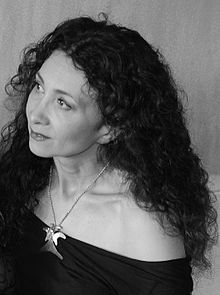Sholeh Wolpé
| Sholeh Wolpé | |
|---|---|
 |
|
| Native name | شعله ولپی |
| Born | Iran |
| Occupation | poet, literary translator, and writer |
| Language | English, Persian, Spanish |
| Nationality | Iranian-American |
| Alma mater | George Washington University, Northwestern University, Johns Hopkins University |
| Notable works | The Conference of the Birds, The Scar Saloon, Rooftops of Tehran, Sin:Selected Poems of Forugh Farrokhzad, The Forbidden: Poems From Iran and Its Exiles, Breaking the Jaws of Silence, Walt Whitman's Song of Myself: Persian Edition, Keeping Time With Blue Hyacinths, |
| Notable awards | 2014 PEN/Heim Translation Fund award, 2014 Hedgebrook Residency, 2013 Midwest Book Award, 2010 Lois Roth Persian Translation Award,Le Château de Lavigny residency |
| Website | |
| www |
|
Sholeh Wolpé (Persian: شعله ولپی)(born 6 March 1962) is an award-winning Iranian-American poet and literary translator. She was born in Iran, and has lived in Trinidad, England and United States. She is the author of four collections of poetry, three books of translations, a play, and is the editor of three anthologies.
Sholeh Wolpé was born in Tehran, Iran and spent most of her teen years in Trinidad and the UK before settling in the United States. The Poetry Foundation has written that “Wolpé’s concise, unflinching, and often wry free verse explores violence, culture, and gender. So many of Wolpé’s poems deal with the violent situation in the Middle East, yet she is ready to both bravely and playfully refuse to let death be too proud.”
In an article for Poemeleon-- A Journal of Poetry Wolpe writes: "I belong nowhere. Every language I speak, I speak with an accent...Being a foreigner everywhere, not belonging anywhere, can be disquieting but once you’re over that, it is liberating. Suddenly you find yourself part of something greater, something indefinable and exhilaratingly new. You are granted access to places the existence of which is not on most people’s radars." Wolpe's recent writings are often about memories of exile and loss. "Her concise, yet emotive lines pull readers into vignettes and anecdotes that expand diaspora and immigrant narratives."
A great deal of Wolpe's work also is concerned about the status of women in the world. "It is my belief" Wolpe said in an interview,"that women must learn to repudiate the unjust standards they are taught by the societies they live in, and empower themselves with a sense of self - demanding justice and equality of rights - and envision for themselves and their daughters a better life than the one imposed on them by male-dominated societies... I don’t think there’s much of a question that we still live in a world dominated and too often defined by men, however, I believe that women need to break out of this competitive mode, and, in particular, be supportive of one another. If we are to truly achieve equality and change the unjust standards imposed on us, women must unite and achieve it collectively."
...
Wikipedia
